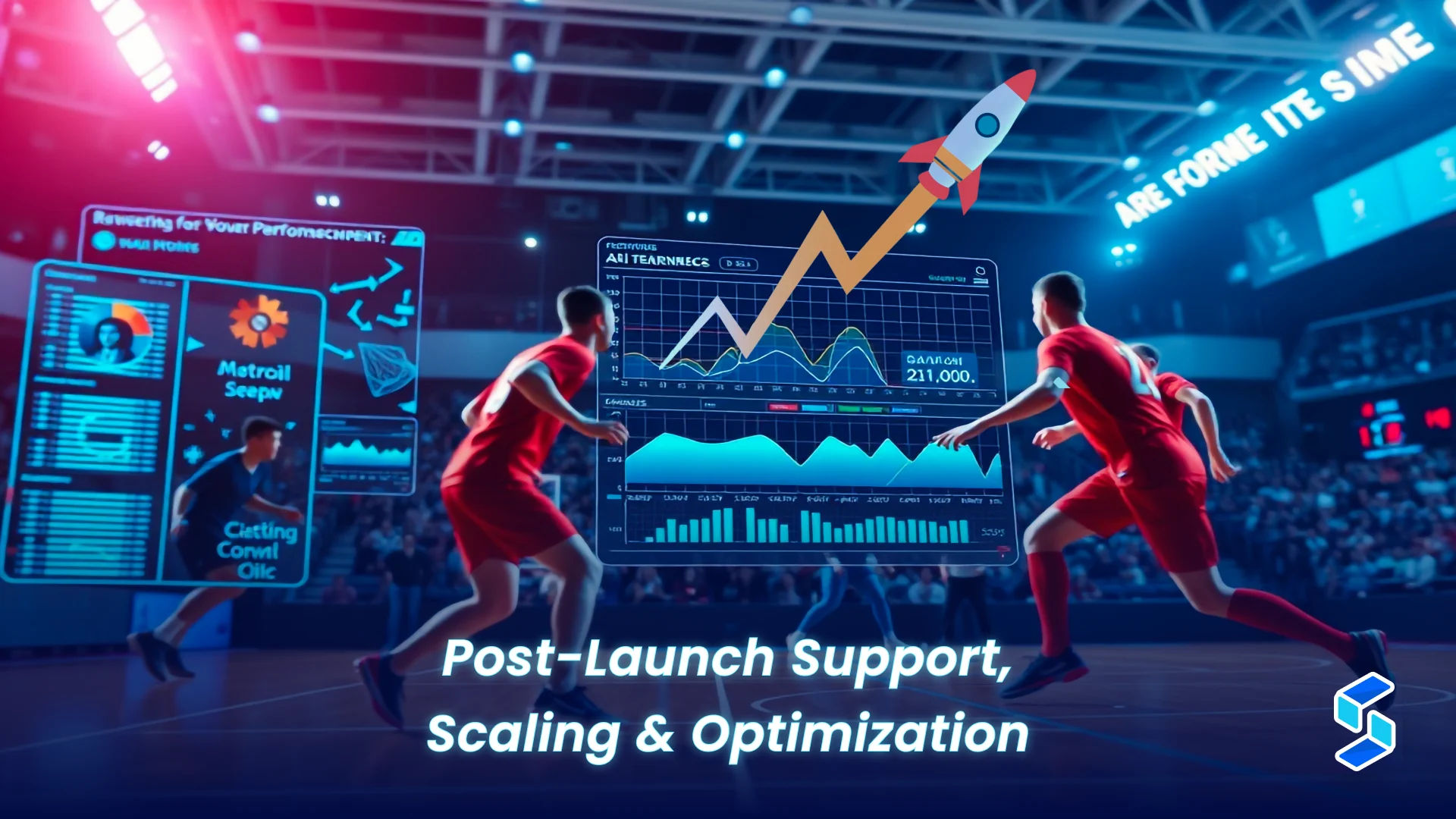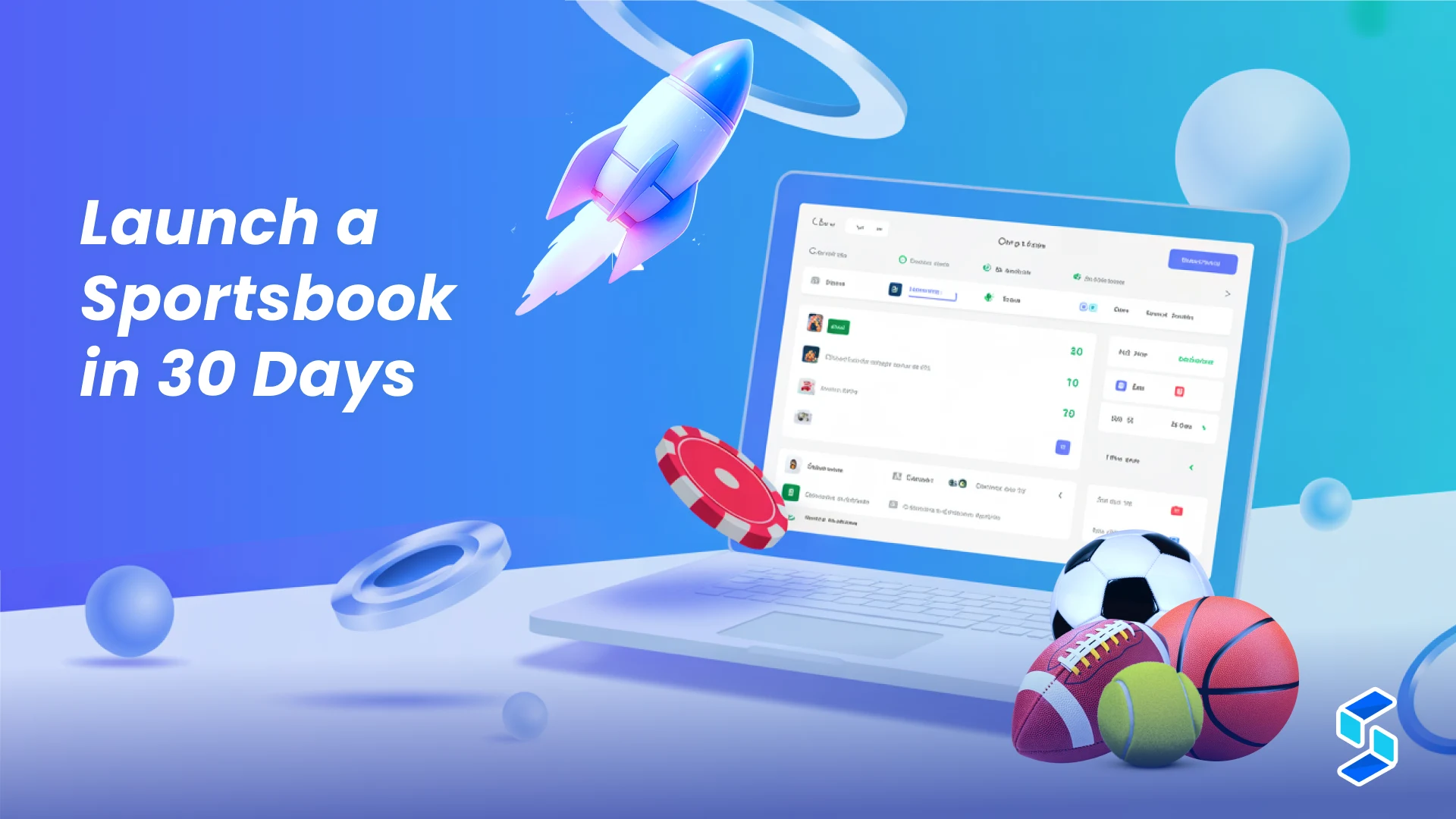If you’re serious about iGaming, you already know this- timing is everything. The sports betting market is experiencing great growth, set to grow from $114.2 billion in 2024 to $124.39 billion in 2025, with emerging regions leading the charge. Latin America’s market hit $4.22 billion in 2024 and is growing steadily. The Philippines is on track for a CAGR of 3.41% from 2025 to 2029, resulting in a market of US$866.81m by 2029.
If you want in, speed is your biggest asset. Launching a sportsbook in 30 days is the right plan to stay ahead. With turnkey platforms offering real-time odds, built-in KYC, and crypto support, you can get live fast while staying compliant.
This guide walks you through a clear roadmap to launch quickly and confidently in these fast-growing markets- a must-read if you’re wondering how to be a bookie efficiently.
Before you can launch in 30 days, you need the right foundation. That starts with understanding what truly makes a sportsbook platform turnkey.
Core Elements of a Turnkey Sportsbook
.webp)
A turnkey sportsbook platform offers a ready-to-launch solution, eliminating the need for building from scratch. It encompasses essential components such as a pre-built architecture, admin panel, betting engine, and wallet system, ensuring a swift and efficient market entry. Below are the essential elements of a sportsbook:
Essential Modules for Operational Excellence
Certain core modules are essential to build a sportsbook platform that runs efficiently and meets user expectations. These components work together to deliver a reliable, secure, and user-friendly experience. To ensure a seamless operation, a turnkey sportsbook should include:
- User Registration System: Facilitates smooth onboarding with secure authentication processes.
- Risk Management Tools: Monitor betting patterns and manage exposure to maintain profitability.
- Comprehensive Reporting: Access to real-time data and analytics for informed decision-making.
- Support Tools: Integrated customer support features to address user inquiries promptly.
Understanding these modules is key to knowing how to be a bookie who can deliver exceptional user experience and compliance.
The Importance of Modular Architecture
Designing your sportsbook with modular architecture helps separate functionalities into distinct, manageable parts. This structure allows your platform to evolve without major disruptions and supports diverse market needs. These allow:
- Flexibility: Easily add or remove features as your business evolves.
- Localization: Adapt to different markets with specific language and currency requirements.
- Scalability: Handle increased user traffic without compromising performance.
This approach ensures that your platform can adapt to various regulatory environments and user preferences, a critical factor when learning how to be a bookie in multiple regions.
Customization Within a 30-Day Window
Launching quickly does not mean settling for a generic platform. Within a 30-day deployment timeline, you can still tailor key aspects of the sportsbook to reflect your brand and meet your audience’s needs. Even with a rapid launch timeline, customization is achievable:
- Branding: Incorporate your unique brand identity into the platform’s design.
- Language Support: Offer multiple languages to cater to a diverse user base.
- Currency Options: Support various currencies to facilitate transactions across regions.
- Payment Methods: Integrate preferred payment gateways to enhance user convenience.
These customizations ensure that your sportsbook resonates with your target audience while maintaining compliance and operational efficiency. Mastering these elements is essential when figuring out how to be a bookie who scales fast.
With your platform’s core components in place, it also has to ensure it delivers accurate, real-time odds. This feature enhances user trust and drives engagement and profitability. Let’s look at its integration and challenges.
Odds Feed Integration

Real-time odds are essential. They ensure that your sportsbook reflects the latest developments in sporting events, providing bettors with accurate information to make informed decisions. This immediacy builds trust and keeps users engaged, as they can react promptly to in-game events.
Sportsbooks using real-time data feeds can offer dynamic odds adjustments, enhancing the betting experience and potentially increasing profitability.
Integration Challenges
Connecting external odds feeds to your sportsbook platform involves technical and operational hurdles. Understanding these challenges is key to delivering accurate, timely information that engages your users. These challenges include:
- Latency: Delays in data transmission can lead to outdated odds, affecting user trust and betting accuracy.
- Synchronization: Ensuring that odds are consistently updated across all platforms and devices is crucial for a seamless user experience.
- Market Coverage: Providing comprehensive coverage across various sports and events is essential to meet diverse user interests.
Addressing these challenges requires a robust infrastructure and reliable data feed providers that prioritize speed and accuracy.
How Source Code Lab Streamlines Odds Feed Setup
At Source Code Lab, we simplify the integration of odds feeds through our advanced APIs and middleware solutions. Our platform supports seamless integration with certified third-party odds feeds, ensuring dynamic and accurate odds adjustments in real-time.
Our middleware bridges your sportsbook platform and data providers, handling data normalization, error checking, and synchronization. This ensures your users receive consistent and up-to-date information, enhancing their betting experience.
Go-Live Ready
Time-to-market is critical in the competitive iGaming industry. Source Code Lab offers pre-integrated odds feeds, allowing you to launch your sportsbook swiftly without the need for extensive development work.
By utilising our turnkey solutions, you can focus on growing your user base and enhancing your offerings, confident that your sportsbook’s core components are robust and reliable.
As you race to launch your sportsbook, compliance isn’t something you can afford to overlook. Know Your Customer (KYC) processes are crucial for preventing fraud, ensuring player safety, and meeting regulatory requirements. A seamless, automated KYC solution allows you to onboard users quickly while maintaining strict compliance and security standards.
Built-In KYC & Compliance

Implementing automated KYC workflows boosts efficiency and compliance by using advanced technologies. These tools reduce manual workload while securing your platform against fraud. To streamline user verification while maintaining compliance, automated KYC solutions integrate technologies such as:
- Optical Character Recognition (OCR): Extracts data from identity documents efficiently.
- Biometric Verification: Utilizes facial recognition to confirm user identities.
- Artificial Intelligence (AI): Analyzes data to detect fraudulent activities and ensure authenticity.
These technologies not only expedite the onboarding process but also enhance security and compliance.
Balancing Speed and Security
While rapid user onboarding is crucial, it should not compromise security. Implementing automated KYC processes ensures that users can quickly access the platform while robust verification measures protect against fraud and underage gambling.
Source Code Lab offers a comprehensive KYC stack that seamlessly integrates into your sportsbook platform. Our solution includes:
- Pre-built modules for swift deployment.
- Support for various verification technologies, including OCR and biometrics.
- Compliance with regional regulations to facilitate licensing processes.
By outsourcing our KYC solutions, you can ensure a secure and compliant environment for your users from day one.
Payments & Crypto Support

Diverse payment options are essential for user satisfaction and operational efficiency. To expand your sportsbook’s reach and cater to a global audience, integrating both local payment methods and cryptocurrencies is essential. This approach provides the flexibility your users demand while ensuring secure, fast, and compliant transactions.
Adapting to Local Payment Preferences
Understanding and integrating local payment methods is vital for user convenience and market penetration. Below are some examples of the preferred payment channels in some of the major markets:
- Brazil: PIX is the most prevalent instant payment method, enabling transactions in under 10 seconds.
- Turkey: PayGiga offers tailored payment solutions for the Turkish market.
- Philippines: GCash is a widely used mobile wallet facilitating easy transactions.
- Eastern Europe: SEPA (Single Euro Payments Area) allows for efficient euro-denominated bank transfers across member countries.
Integrating multi-currency wallets and crypto support is a strategic move that anyone serious about how to be a bookie must understand.
Integrating Multi-Currency Wallets
Implementing wallets that support both fiat and cryptocurrencies is essential to catering to a global user base. This flexibility allows users to transact in their preferred currencies, enhancing user experience and broadening market reach.
Utilizing Cryptocurrency Benefits
Adopting cryptocurrencies in your sportsbook payments introduces advantages that improve transaction speed, reduce costs, and protect user privacy, helping you cater to a broader audience.
- Speed: Transactions are processed rapidly, often within minutes.
- Low Fees: Reduced transaction costs compared to traditional payment methods.
- Privacy: Enhanced user anonymity, which is particularly beneficial in regions with stringent gambling regulations.
Ensuring Security and Compliance
While offering diverse payment options, it’s imperative to maintain robust security measures and comply with AML and KYC regulations. Implementing real-time monitoring and verification processes helps in mitigating risks associated with financial transactions.
Source Code Lab’s Payment Integration Solutions
Source Code Lab provides ready-made payment modules that seamlessly integrate with various gateways, including support for local payment methods and cryptocurrencies. Our solutions ensure:
- Quick and secure transaction processing.
- Compliance with regional financial regulations.
- Scalability to accommodate growing user bases and transaction volumes.
By utilizing our payment integration services, you can offer your users a seamless and secure transaction experience, tailored to their regional preferences.
The 30-Day Sportsbook Launch Roadmap

Launching a sportsbook in just 30 days demands precise planning, coordinated execution, and focused effort across multiple areas. This roadmap breaks down the process week by week, guiding you through critical phases. Following these steps, you can rapidly build a compliant, scalable, and user-friendly sportsbook. Here’s a week-by-week breakdown to guide you through the process:
Week 1: Strategy, Platform Setup & Customization
The first week focuses on laying a solid foundation by defining your market strategy, selecting the appropriate platform, and customizing core modules to align with your brand and target audience.
Key Steps:
1. Market Analysis and Strategy Development:
-
- Identify target regions (e.g., Latin America, Eastern Europe) and understand their regulatory landscapes.
- Assess competitor offerings to determine unique value propositions.
2. Platform Selection:
-
- White-Label Solutions: Quick to deploy with pre-built features but limited customization.
- Turnkey Solutions: Balance between customization and speed to market.
- Custom Development: Fully tailored but requires more time and resources.
3. Branding and Localization
- Develop a compelling brand identity, including logo, color schemes, and messaging.
- Implement localization features such as language support, currency options, and cultural nuances.
4. Core Module Configuration
-
- User Registration: Design intuitive sign-up processes with necessary security measures.
- Wallet System: Set up secure and versatile wallet functionalities for deposits, withdrawals, and balance tracking.
- Back Office: Configure administrative tools for user management, reporting, and analytics.
Week 2: Odds Feed & Sportsbook Engine Integration
This week involves integrating real-time odds feeds and configuring the sportsbook engine to ensure accurate, timely, and engaging betting experiences for users.
Key Steps:
- Odds Feed Integration
-
- Select reliable odds feed providers (e.g., Sportradar, Betgenius) based on market coverage and latency.
- Utilize APIs and middleware to integrate feeds, ensuring real-time updates and synchronization.
2. Sportsbook Engine Configuration
-
- Define the sports and events to be covered, tailoring offerings to your target market’s interests.
- Ensure a wide range of betting options to enhance user engagement.
3. Performance and Latency Testing
-
- Conduct latency checks to test the responsiveness of odds updates and betting transactions.
- Simulate high-traffic scenarios to ensure platform stability under load.
Week 3: KYC, Payments & Regulatory Preparation
Week three focuses on integrating robust KYC processes, setting up secure payment gateways, and preparing for regulatory compliance to ensure a trustworthy and legal operation.
Key Steps:
1. Automated KYC Implementation
-
- Integrate technologies such as OCR, biometrics, and AI-driven identity checks to streamline user verification.
- Ensure KYC processes meet regional regulatory standards.
2. Payment Gateway Integration:
-
- Incorporate region-specific payment options like PIX (Brazil), GCash (Philippines), and SEPA (Europe).
- Enable transactions with cryptocurrencies like Bitcoin, Ethereum, and stablecoins to cater to diverse user preferences.
3. Regulatory Preparation
-
- Compile necessary certifications and compliance documents for licensing.
- Conduct internal audits to ensure all systems meet regulatory requirements.
Efficient management here shows how to be a bookie who runs a secure, compliant business.
Week 4: Final Testing, QA & Soft Launch
The final week is dedicated to comprehensive testing, quality assurance, and executing a soft launch to identify and address any issues before the full-scale launch.
Key Steps:
1. Comprehensive Testing
-
- Functional Testing: Verify all features operate as intended across devices and browsers.
- Security Assessment: Perform penetration testing to identify and rectify vulnerabilities.
- Load Testing: Reassess platform performance under simulated peak loads.
2. Soft Launch Execution
-
- Launch the platform to a select user group to gather feedback and identify issues.
- Monitor user behavior, transaction flows, and system performance in real-time.
3. Final Adjustments and Go-Live
-
- Address any problems identified during the soft launch promptly.
- Deploy the platform to the broader market, accompanied by targeted marketing campaigns.
By meticulously following this 30-day roadmap, you position your sportsbook for a successful launch, equipped with the necessary tools, integrations, and compliance measures to thrive in the competitive iGaming landscape.
Post-Launch Support, Scaling & Optimization

Once your sportsbook is live, there’s no such thing as off-hours. Players place bets around the clock, and any technical glitch or delay can cost you users and revenue. That’s why 24/7 support isn’t optional. You need real-time assistance to address live environment issues, whether it’s server downtime, odds feed lags, or user verification delays.
Scaling for Growth
Launching is just the beginning. As your user base grows, you’ll want to expand your offering by:
- Adding more sports and betting markets.
- Supporting high-traffic events like the World Cups or the Olympics.
- Introducing new features like same-game parlays or live betting.
A scalable platform ensures you can handle growing traffic without performance drops. Our modular architecture supports seamless feature rollouts, so you can evolve without disrupting operations.
Gamification & Retention
Acquiring users is one thing, keeping them engaged is another. To boost retention and lifetime value, gamification is key. Integrate features like:
- Loyalty points and level-up systems
- Tournaments with leaderboard prizes
- AI-powered personalization for tailored offers and bet suggestions
These elements increase engagement and encourage repeat play, turning casual users into loyal bettors.
Ongoing Compliance & Odds Optimization
Staying compliant isn’t a one-time task. Regulatory rules change, especially in emerging markets. You also need to keep your odds sharp and competitive. Source Code Lab continuously monitors compliance updates and offers automated odds optimization tools to help you:
- Meet evolving licensing requirements.
- Deliver real-time, accurate betting lines.
- Avoid manual errors and reduce risk exposure.
Conclusion
Launching your sportsbook in 30 days is within reach when you combine speed with the right technology and expertise. Our roadmap shows that rapid deployment doesn’t mean cutting corners. It means smart choices: turnkey platforms, real-time odds feeds, built-in KYC, and flexible payment options.
Source Code Lab is your trusted partner to build and scale your sportsbook confidently. With over five years of iGaming experience, fully integrated tech, and 24/7 multilingual support, we ensure your launch is fast, compliant, and tailored to your target markets.
Ready to take the leap?
Book a free consultation or demo today and start your sportsbook journey with Source Code Lab by your side.


